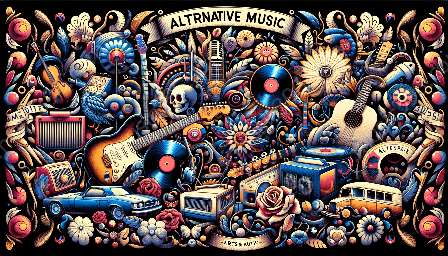Industrial music is a genre that challenges traditional notions of sound, melody, and rhythm. It has a rich history and has influenced other music genres across the world. In this topic cluster, we will delve into the origins, characteristics, and impact of industrial music, and its compatibility with various music genres.
The History of Industrial Music
Industrial music emerged in the mid-1970s, with roots in the industrial and experimental music scenes. Artists like Throbbing Gristle, Einstürzende Neubauten, and Cabaret Voltaire were pioneers in shaping the genre's distinctive sound. They incorporated elements of noise, found sounds, and electronic experimentation to create a dark, abrasive, and at times, confrontational sonic landscape. Industrial music became a platform for artists to express their disillusionment with societal norms, consumerism, and political repression.
Characteristics of Industrial Music
Industrial music is characterized by its use of unconventional instruments, machinery, and electronic manipulation. Distorted vocals, aggressive percussion, and dissonant melodies are common elements in industrial music. The genre often explores themes of dystopia, alienation, and the darker aspects of human existence. The music's relentless energy and stark, industrial aesthetic captivate audiences and challenge their perceptions of sound.
Influence on Other Music Genres
Industrial music has significantly influenced other genres such as electronic, metal, and experimental music. Its innovative approach to sound production, sampling, and sonic manipulation has inspired countless artists to push the boundaries of creativity. Bands like Nine Inch Nails, Ministry, and Skinny Puppy have brought industrial music to mainstream attention, further cementing its impact on popular music culture.
Compatibility with Music Genres
While industrial music has its distinct qualities, its fusion with other music genres has led to the birth of subgenres like industrial rock, industrial metal, and darkwave. These blends have expanded the sonic landscape of industrial music, making it compatible with a diverse range of musical styles.
Conclusion
Industrial music is a dynamic and innovative genre that continues to evolve and inspire musicians and audiences around the world. Its defiance of conventional musical norms and its compatibility with various genres make it a prominent force in the music industry. As industrial music continues to thrive, its influence on music and audio culture remains indelible.
Topic
Technological Innovations in Industrial Music Production
View details
Role of Industrial Music in Film and Media Soundtracks
View details
Aesthetics and Visuals in Industrial Music Performances
View details
Industrial Music and Avant-garde Music Relationships
View details
Global Trends and Movements in Industrial Music
View details
Industrial Music's Intersection with Architecture and Design
View details
Political and Social Implications of Industrial Music
View details
Industrial Music's Contributions to Experimental Music
View details
Educational Pathways for Aspiring Industrial Music Producers
View details
Industrial Music and Technological Advancements
View details
Cultural Implications of Industrial Music on Underground Music Scenes
View details
Cross-genre Collaborations and Influences in Industrial Music
View details
Industrial Music's Address of Contemporary Environmental Issues
View details
Theoretical Frameworks for Analyzing Industrial Music Compositions
View details
Industrial Music Influence on Sound Design and Audio Engineering
View details
Questions
How has industrial music influenced other music genres?
View details
What are the major characteristics of industrial music?
View details
Who are the most influential industrial music artists?
View details
How does industrial music utilize technology in music production?
View details
What impact does industrial music have on social and cultural issues?
View details
What are the key elements of industrial music composition?
View details
How does industrial music reflect the industrialization era?
View details
What are the subgenres of industrial music and their distinctions?
View details
How is industrial music integrated into film and media soundtracks?
View details
What is the role of visuals and aesthetics in industrial music performances?
View details
What are the key record labels and hubs dedicated to industrial music productions?
View details
What are the relationships between industrial music and other avant-garde music genres?
View details
What are the historical origins of industrial music?
View details
What are the key ethical considerations in industrial music production?
View details
How does industrial music utilize sampling and sound manipulation techniques?
View details
What are the essential software and hardware tools for creating industrial music?
View details
How is industrial music used in therapeutic and psychological settings?
View details
What are the political implications of industrial music lyrics and themes?
View details
What are the global trends and movements in industrial music?
View details
How does industrial music intersect with architecture and design?
View details
What is the role of industrial music in modern protest movements?
View details
What are the contributions of industrial music to experimental music scene?
View details
How does industrial music challenge traditional musical forms and structures?
View details
What are the key challenges faced by industrial music artists in the industry?
View details
What are the educational pathways for aspiring industrial music producers?
View details
How does industrial music engage with industrial and technological advancements?
View details
What are the cultural implications of industrial music on underground music scenes?
View details
What are the cross-genre collaborations and influences in industrial music?
View details
How does industrial music address contemporary environmental issues?
View details
What are the contributions of industrial music to music therapy practices?
View details
What are the theoretical frameworks for analyzing industrial music compositions?
View details
How does industrial music influence sound design and audio engineering practices?
View details












































